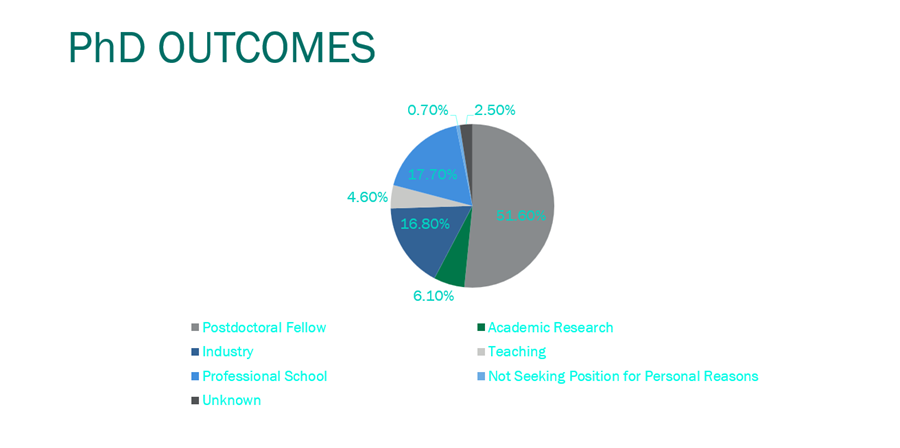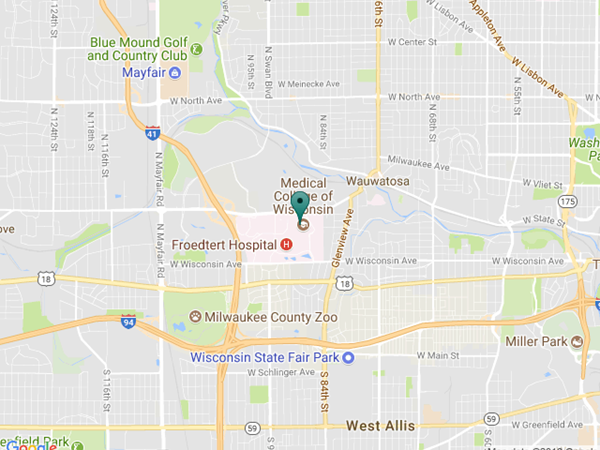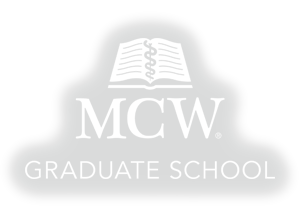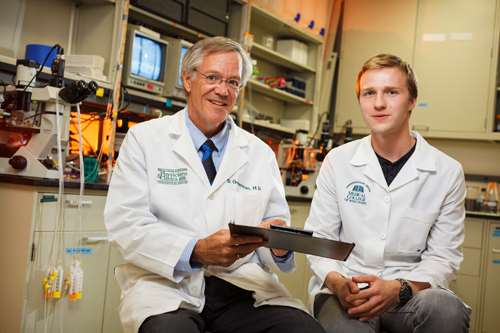About the Medical College of Wisconsin Graduate School
The MCW Graduate School offers master’s and doctoral degrees, certificate programs and postdoctoral education opportunities, along with the opportunity to train with nationally recognized biomedical and health researchers while contributing to cutting-edge, highly translational medical research and improved public and community health.
We are a major component of the research engine of MCW that drives discovery, fueling the passion and creativity that lies within students and faculty to find solutions to the world’s most pressing health challenges.
The Dean's Message
 The Medical College of Wisconsin (MCW) Graduate School is dedicated to providing a rich and stimulating educational environment, supporting students who wish to study biomedical or health sciences. We are committed to supporting our students with state-of-the-art educational programs, customized for each student to deliver a unique and specialized learning experience, including the ability to participate in world-class research, discovery and invention.
The Medical College of Wisconsin (MCW) Graduate School is dedicated to providing a rich and stimulating educational environment, supporting students who wish to study biomedical or health sciences. We are committed to supporting our students with state-of-the-art educational programs, customized for each student to deliver a unique and specialized learning experience, including the ability to participate in world-class research, discovery and invention.
Our graduate school experience is delivered by renowned faculty, committed not only to their specific areas of research, but mentoring the next generation of researchers, scientists and health leaders to further propel biomedical science and public and community health.
MCW is the second largest research institution in Wisconsin, and our faculty secures nearly $160 million annually for research. Our faculty and students collaborate on projects related to cancer, cardiovascular systems, genomics, proteomics, stem cell biology, neurosciences, traumatic brain injury and imaging, infectious diseases and immunology, and community and population health.
MCW’s Graduate School presently offers 13 PhD and 15 Master’s degree programs, as well as several graduate certificate programs, serving the needs of students in all stages of their career development. Additionally, we provide an intellectually challenging and enriching education experience, boasting innovative research opportunities for every student. Our one-to-one student to faculty ratio allows for unprecedented individual attention, delivering structured support to students, helping them to become leaders in their chosen field.
I personally invite you to learn more about the graduate programs available to you at MCW, and I look forward to assisting you on your personal journey to become the health scientist or health sciences leader that you wish to be.
Daisy Sahoo, PhD
Dean, School of Graduate Studies; WIS Founders Circle Endowed Professor; Professor of Medicine
Graduate Student Outcomes

Fueled by curiosity, focused on health.
LEARN
The MCW Graduate School is designed to provide you with a unique, specialized learning opportunity. Your program can be customized to align with your research and learning interests, and you will have access to the latest technology and equipment throughout your educational experience. The small class sizes and labs at MCW offer one-on-one attention, fostering an atmosphere of collegiality and teamwork, all from an institution that has a great national reputation as a leader in health, science and medicine.

DISCOVER
The wide range of programs offered at MCW - spanning biomedical sciences, translational science and public and community health - are all designed to help prepare you to become a leader in science. MCW gives you the freedom to direct your career toward working in a laboratory, university, the biotechnology industry or population health, while providing you the opportunity to perform clinically relevant research at an academic medical center. The support and mentoring offered to students by our premiere faculty has aided many of our students in attaining competitive grants and national fellowships at the graduate level. What will you discover at MCW?

INNOVATE
As an MCW student, you can chart your course for new lines of biomedical investigative study or approaches to improved public and community health. You will have the opportunity to work with top faculty researchers who have pioneered numerous medical firsts. As the second largest research institution in Wisconsin, we are focused on translating our medical discoveries into treatments, therapies and protocols that will transform the lives of future patients, families and communities.

LEAD
Your journey at MCW will prepare you to become an entrepreneurial leader, under the guidance of renowned role models and mentors who will encourage you to participate in their cutting-edge research investigations. Our students contribute throughout their education to innovative studies involving cancer biology, immunology, regenerative medicine, addictive behavior, neurodegeneration and sleep deprivation, among others. An MCW Graduate School education is designed to propel your career to new heights, as you join our many distinguished alumni who are now leaders in universities, healthcare systems, biotechnology companies, medical research organizations and community health advocacy organizations throughout the country.

Annual Campus Safety Report
Statement to Prospective Faculty, Staff and Students:
The Medical College of Wisconsin (MCW) prepares and publishes its Annual Campus Safety Report in compliance with the Higher Education Act of 1965, otherwise known as the Jeanne Clery Disclosure of Campus Security Policy and Campus Crime Statistics Act (Clery Act). This report outlines MCW’s security policies and discloses campus crime statistics for the three most recent calendar years.
This report is available to all current and prospective faculty, staff and students. An electronic version of the report can be accessed at this location. A paper copy of this report may be obtained by contacting Medical College of Wisconsin, Public Safety, 8701 Watertown Plank Rd., Milwaukee, WI 53226 or by calling (414) 955-8295.
Follow Us On Our Socials
Stay up-to-date on events, news, and other happenings in the MCW Graduate School!





 The mission of MCW’s Graduate School of Biomedical Sciences is to provide world‐class research and training opportunities for students in the biomedical and health related sciences environment, which cultivates and integrates basic science and clinically oriented research, applied learning and community.
The mission of MCW’s Graduate School of Biomedical Sciences is to provide world‐class research and training opportunities for students in the biomedical and health related sciences environment, which cultivates and integrates basic science and clinically oriented research, applied learning and community. The MCW Graduate School has received accreditation from the
The MCW Graduate School has received accreditation from the  MCW’s Graduate School will prepare you as a leader, putting you on a pathway to contribute meaningfully to the body of scientific knowledge and improved public health, whether you want to advance scientific research and help pioneer treatments to eradicate society’s most devastating diseases, or if you’re focused on helping your friends and neighbors in your community lead healthier lives.
MCW’s Graduate School will prepare you as a leader, putting you on a pathway to contribute meaningfully to the body of scientific knowledge and improved public health, whether you want to advance scientific research and help pioneer treatments to eradicate society’s most devastating diseases, or if you’re focused on helping your friends and neighbors in your community lead healthier lives.